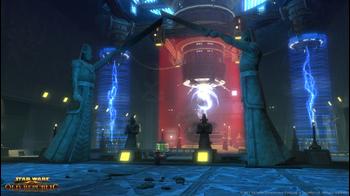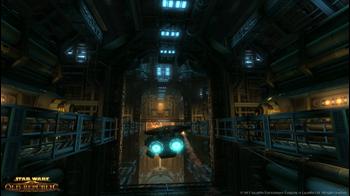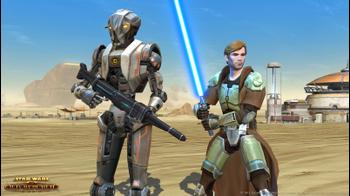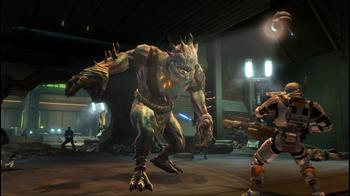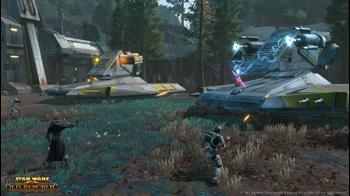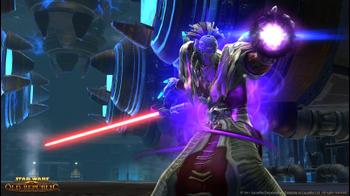The Old Republic Interview: Bioware's Jeff Hickman
In the wake of the news that The Old Republic was going to add a free-to-play option in addition to its subscription-based offerings, EA gave us the chance to sit down and chat to Jeff Hickman, the Executive Producer of Live Services for Bioware. He plays an instrumental role in the day-to-day runnings of The Old Republic.
With a background rooted in Mythic Entertainment, Hickman has a long history with MMOs - first on Dark Age of Camelot and then on Warhammer Online: Age of Reckoning. We quizzed him not only on the future of The Old Republic, but of the MMO genre in general. Here's what he said.
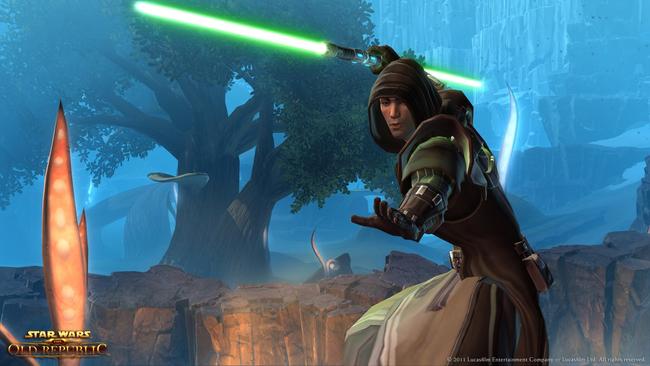
RPG Site: It'd be crazy not to start with the free-to-play stuff. I was really struck, sitting in the press conference, at the statement "We believe in free-to-play" - it's a bold statement. Do you think anybody can launch a paid-for MMO in today's climate and succeed? Or has the time for that model passed?
Jeff Hickman: Well, I can give you my opinion, okay? In my opinion, I think the big, subscription-based MMO market is gone.
I think that as with anything, there are possibilities you could come out with an MMO now and have a successful subscription model and succeed in the long term, but I think it's an exception. I think that at this point, players like to try things before they buy them.
They don't like the feeling - and it's truly just a feeling, I think - of commitment. Because the reality is, when you go to look at these free-to-play games - any free-to-play game, really, MMO or not - there is a monetary commitment, it's just a different type of monetary commitment. If you look at free-to-play games, they're making lots of money.
But the players - the generation of gamers who are growing up now and are in their teens and their twenties looks at games and says "I'm not going to listen to the marketing, I'm gonna go and play the game, make my own judgment call, and if I like that game, I will pay you. In fact, I'll pay you a lot!"
So I think, number one, the free-to-play MMO market has a giant opportunity ahead of us. This is an opportunity we must take - and in my opinion I'd say to MMO developer right now - they should be looking at free-to-play."
RPG Site: I'll be really interested to see if Blizzard goes for a subscription model with whatever they do next for exactly this reason.
Hickman: Y'know, Blizzard's an interesting case in that they're the - if you look at the marketplace they're the one exception. The one exception to the stuff I was talking about is WOW. But I would put money on Blizzard not having - their next MMO not being 'pure' subscription.
RPG Site: Earlier today I was talking to the guys who are trying to fix Final Fantasy XIV, and they're committed to the subscription model. I think they have a slight advantage for being the only really large Japanese MMO that exists.
Hickman: Yeah. You're right - and they kind of have a market where people love them, which really does help. It's hard, but I ask - why put new hurdles in your way? There's lots of difficulties to launching an MMO, plenty of people have learned that, why make that - subscriptions - one of the difficulties?
RPG Site: Going from paid to free-to-play is a delicate transition. Have you pulled in any advice from any other friendly studios in the industry?
Hickman: [Laughs] We did a lot of homework! A lot of homework, yes. As you can imagine - just look within EA. EA's got many - depending on how you look at it - many free-to-play type games that are monetizing well. We've got people that have done it, people who have been through that.
When you look outside of EA, there's a lot of studies in success and failure in taking an MMO free-to-play. So, yeah - we've done a whole lot of research.
RPG Site: The Old Republic was always a game that I anticipated would get traditional expansion packs, on a disc. Going free-to-play changes the playing field for that, I suppose?
Hickman: I think that it provides opportunities for us to do things differently if we choose to.
RPG Site: What would be the advantage of taking a free-to-play expansion over a paid disc or download?
Hickman: Here's my belief - I think that players today consume content differently than they did 15 years ago or 10 years ago. When I was working on Dark Age of Camelot, players would wait for 18 months for another expansion happily. There weren’t a lot of other things for them to go to, it was a specific genre that they loved, and there were very few games to choose from.
Now - there's a lot of competition out there. If you don't keep your gamers interested with interesting new things coming out, I think the opportunity for them to go and find something new is very large.
So, along with the free-to-play it's our belief that we need to get out in front of our content at a more rapid pace.
We think it's more important to show consistent, interesting content updates - let's say every six weeks - than go for every three months, or every year, or that kind of thing.
Now, that's not to say we're not going to do bigger updates periodically - because we are talking about that type of thing. There are some interesting plans on the horizon I can't talk about yet that I think are going to make people go "wow, that's really cool."
I think that just like free-to-play is a business model that I think today's gamers want to look at, I think that doing more frequent, interesting content pieces is something also that they want to see.
RPG Site: Being from RPG Site, we present to a pretty hardcore audience - but free-to-play opens the game up to an entirely different, softer demographic. How do you entertain both a hardcore MMO fan and a Star Wars fan, who perhaps isn't that big of a gamer at all?
Hickman: I have a great answer to this; I just have to think how to say it! [Laughs] It's one of the reasons where, if you look at what our free to play offering is - levels 1-50, the core of the game. I'd call it a narrow but a very deep experience in our game, where we're trying to offer... Y'know, people ask us the question "Why are you giving away so much?"
The answer is exactly your question - we want the casual gamer to be able to come in and experience what I would consider maybe not the best - that's perhaps not the best way to say it - but the most accessible, interesting Star Wars gameplay experience out there.
You'll find that the more hardcore or core RPG fans want to spread their wings and see the full breadth of the content. The breadth of the content is some of the things we're putting restrictions around.
If you look at some of the restrictions we've talked about, we restrict the number of warzones you can do in a given time. One of the reasons we're doing that is so that the hardcore knows that they've got this gameplay that they can experience, while the casual gamer knows that they can get the experience they're looking for and buy into the other experiences if they want to.
RPG Site: This is a big piece of software. Getting into this requires a lot more commitment - in terms of hard drive space and downloading the file, for instance - than booting up Farmville. Have you looked into ways to slim the game size, or stream the game OnLive style or anything like that?
Hickman: Erm... we're not prepared to talk about that. I think I can say that it would be... it would be the right thing to do to look at that stuff for exactly the reason you just said. People want to get in fast. We definitely have it in the back of our heads as to how we can do that kind of stuff. No plans right now. Though I do have an email in my phone about it!
RPG Site: You came from Mythic--
Hickman: I did Dark Age of Camelot, I did Warhammer Online... In fact I was the first EP on Ultima Forever. Then I moved over to TOR.
RPG Site: How's the evolution of moving within EA, and this project being Bioware technically been for you personally? What has it bought to development?
Hickman: Oh, man! I could tell you long stories about what my life was like 15 years ago in the 90s when I was an IT networking director and I did this very specific job which I loved. I loved the job that I did, but way back when, boy, I hated my job - I hated where I did it, all that.
Coming into the industry and working as Mythic and then as part of EA and then for Bioware within EA... It’s a glorious dream for me. I don't know how to say it. When people say you have a dream job - I have my dream job.
I love every day that I go to work, I get up in the morning and even days that are really hard, which it can be hard work - I always go home at the end of the night and go... "Yeah, I'm making video games."
What else can you say? I love the people I work with - the people at Bioware are unbelievable rock stars. Growing up - I'm a gamer, and an RPG man, like you - in the 90s, some of my most beautiful memories are of Baldur's Gate, then Knights of the Old Republic and Neverwinter Nights. I love these games.
I go down to Austin to work on TOR - and who am I working with? Who's my creative director? James Ohlen, the creator of most of those games. I literally sit 3 feet away from James Ohlen right now. James works with me every day as my creative director on TOR, and I just sit back sometimes and look at him and am like... "Y'know, 15 years ago, I'd be at your desk asking for your autograph." It's just wonderful.
I think personally - as you should, and I know people like to say this, but I feel like its true, for me and for a lot of the team members... We've got a lot of experience and a lot of background in things that are good and have been successful but also in things that are not good and haven't been as successful as we wanted them to be. The key is to learn how to mix those two things together, learn from your past - so you can apply them in a great way for the future.
I think if you look at Bioware Austin, you see that now - where people are looking at things they've done in the past, looking at what the future is - what the future gaming generations are...
Things like the studio being able to accept free-to-play; that's a huge deal. I was at Mythic when we started to make that change also, with Warhammer Wrath of Heroes. It's hard to get the studio to think like that. If you look at Austin, all of them have turned the corner exceedingly fast on saying, "Huh, this is the right thing for us to do, it's the right future."
Everybody's learned from the past and is looking forward to what that's going to mean for us. I'm excited - everybody's excited. If you go into the studio, the energy, the feeling - almost of rebirth, if you will - is fantastic.
RPG Site: Bioware and EA are one part of the DNA of this game - the other part is LucasArts. How has their interaction with you been since launch? Is it as deep as it was prior to launch?
Hickman: Absolutely. They're here today! They're with us every step of the way. They of course care deeply, as we do, about the IP, and they're involved with everything we do. Literally everything we do - in a good way. We're great partners.
RPG Site: In general, not necessarily related to TOR - do you think console MMOs are something that can happen and be successful?
Hickman: Yeah, I think they're possible. I think it's hard - I don't know how else to say it. There are successful console MMOs right now - DC Universe - that's a good, console-based MMO. Some would say a great console MMO.
I just think you have to look at the platform your game is on, and you have to modify the game you have for that platform and the audience that's on that platform, which they have.
I think for MMOs that means you have to look at how to develop social in a way that makes sense, how to develop a control scheme that makes sense... but I actually think that MMOs need a pretty core change anyway.
If you look at the MMOs - not all of them - but many of the MMOs being made today compared to Everquest, Dark Age of Camelot - the old, early 2000s MMOs - there are still a lot of similarities. I think it's time, and I think that the consumer would agree that it's time that we start looking at how to break away from that.
Look at how to provide different types of gameplay experiences, different types of combat, different types of social experiences... there's some really interesting concepts out there that could be unbelievably great.
RPG Site: The way I look at it is I see those early 2000s MMOs as generation one, and WOW, Final Fantasy XI, Warhammer and the like as generation two. Do you think we'll see the start of a third generation soon?
Hickman: Maybe. I think within the industry you get a lot of arguments that we're on generation four or five right now. I look at that and go - look - I'm unclear if we're not still in generationone, to be fair.
It's not that we haven't evolved, but it's been this evolution of new and interesting things - but all based off Everquest. Look at Everquest - you have a hotbar, you have some buttons, it's turn-based, there's a bunch of quests, you walk around in the land. Look at that and compare it to the MMOs of today.
I could actually describe those MMOs in a very similar way. It doesn't make them bad - I love them, I've played all of them - but if you look at that... how is what was done then and what is being done now two or three generations apart?
Yes, you can point to the graphics or how the gameplay is smoother and better, but does that make it a different generation? I don't know. I think it needs to have something different. What that is I'm not sure. Maybe I know what it is and don't realize it yet.
RPG Site: I'd argue you had a good stab at doing something really new with your newfound emphasis on story. On the flip-side, though, what do you say to criticisms that TOR feels more like a co-op game than an MMO? More MO-RPG than MMORPG?
Hickman: Yeah, I disagree vehemently about it. I think you can say that about a lot of games, and it depends on how you want to play the game. What we tried to do was provide an experience that was fun and accessible to a broad range of players.
So we tried to provide that story experience - and in some cases a single-player type experience where you can go through and play the game alone if you really want to - but you can say the same thing about WOW. WOW has that also - I personally have levelled from 1-60 solo in WOW. Is that a single player game? No. Absolutely not.
Yet we also provide a broad variety of multiplayer and massively multiplayer opportunities within the game - whether it be PVP, Operations, Flashpoints - and so I think it matters how you play the game. I think what happens is people get so tied up in the story that they say "I don't need anybody else." Well, yeah, you may not need anybody else for the story, but that's not the entire game.
So, I disagree with that standpoint. If you want to play the game single player, fine, but if you want to play with others there's plenty of ways and people to do so with.
RPG Site: In relation to criticism - you have a melting pot of two of the most vocal groups of fans on the planet - Star Wars fans and MMO fans. How do you as a studio process and deal with that?
Hickman: Very carefully! There are two things I'd say about that. Number one - and I've always held strong to this - I think that passion in our fans in any way is better than apathy from our fans. If somebody is passionate enough to yell about something they don't like, I'll take that. If somebody is passionate and yells about something they do like, I'll take that too.
I'd rather have everybody be positive, but it's one of those things about the Bioware products - the emotion we have about our products - it's one of the things that makes them great, drawing out that emotion. So, number one, I love to have that passion about the fans.
How we process it internally - we truly have a lot of different systems and processes in place inside the studio to both look at data - pulling data from the game looking at how people are playing and what they're doing - but also gathering the feedback from the community, from the forums, from emails - you name it. Even from how we all feel about it ourselves!
Two times a week, we have a meeting where we bring all the team leaders together - we sit, I sit, our team leaders sit - and we look at the subjective and objective feedback from the game. We look at it and we go "Is there something here that's important for us to really do something about?"
We pay attention to all of it - it doesn't mean we're necessarily going to change the game based off it - but we definitely look at that stuff and go "Ah, this is something that's come up a number of times, supported in the following ways...” and then we put it on our dev schedule.
RPG Site: People were unsure what to think when free-to-play was first announced. Was it reactionary, part of the plan...? How do you and the studio feel about how things have gone so far for the game?
Hickman: Hum. That's a great question. There's a number of ways I can answer that, and different people in the studio would answer it differently. Let you give you my opinion and my personal impression about it.
When we launched the game, I can remember two weeks after launch, sitting in our live production area - it's like a command centre - and we've got all the servers up on the boards, all the numbers going up and down.
I can remember sitting back... emotional. Thinking to myself, wow, we've finally done it. This is the game that we always wanted it to be. Our players love it, they're deeply engaged. In general the feedback we're getting is very good... and I think the studio to this day feels that. That feeling of success.
I think in our last announcement we're less than a million but north of 500,000 - that's a lot of damn subscribers. For anybody to look at us and go "you haven't done very well" - I just shake my head at them. We have a fantastic game.
If anything, when you look at some of the things that we see - it's not "I'm quitting the game because I hate the game." What we found - and it was probably the thing that made us go "Oh, wow, that's interesting..."
In general we had planned, based upon our experiences with other MMOs and various research, that a player would play the game for two hours a night on average. Based upon that average, we do the math off that, it would take this long for a general player - not the hardcore - to consume all of our content.
What we found was our players were actually playing the game for five to six hours a night, and that still holds true today. Our average play-time is five hours a night. I look at that and I'm like "Oh my god." So, if there's one thing the players are saying - and we feel it in the studio - it's how to get content out in front of our players faster.
They're consuming it very quickly. MMO professionals are saying "of course they're going to consume your content quickly," - yeah, but - three times faster than the normal rate of any other MMO we've got out there? I think that's a symptom of us having great story content. You just blast through the story, y'know?
So, I think we have this feeling of success, this feeling of greatness... but it's tempered by the fact that we'd love to be bigger, we'd love to be better. That was kind of what led us down the path of free-to-play.
It's not reactionary, but we've always had it in our head, considering it, watching it, like, I wonder... It became very apparent to us that if we want to be bigger and get our awesome product out to more people, we need to lower the barrier so they can come try the game and fall in love with it as so many people have done.
We can say hey, it's free - come and play our game! That stuff that people have been playing for five hours a night - you can do that too - for free.
